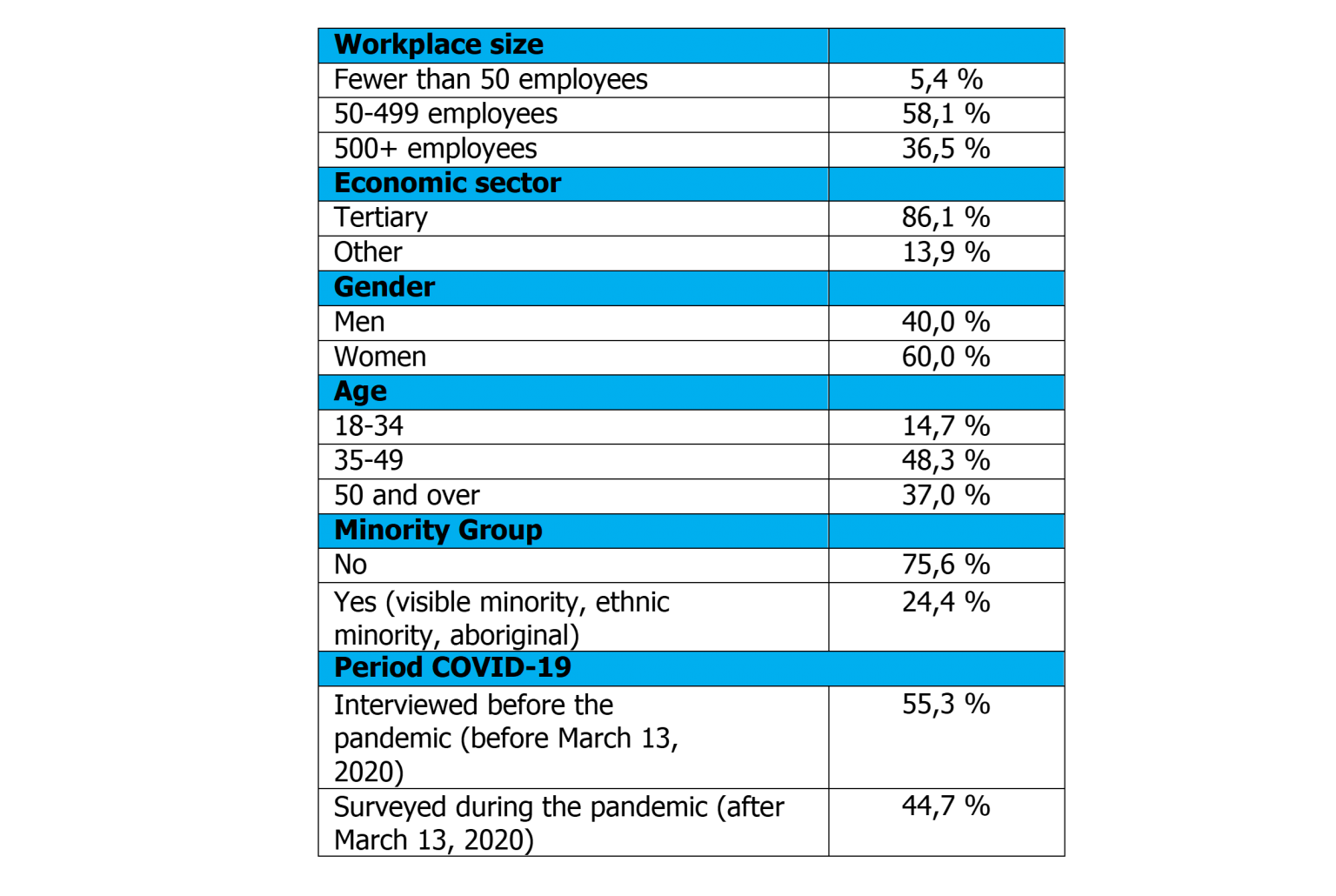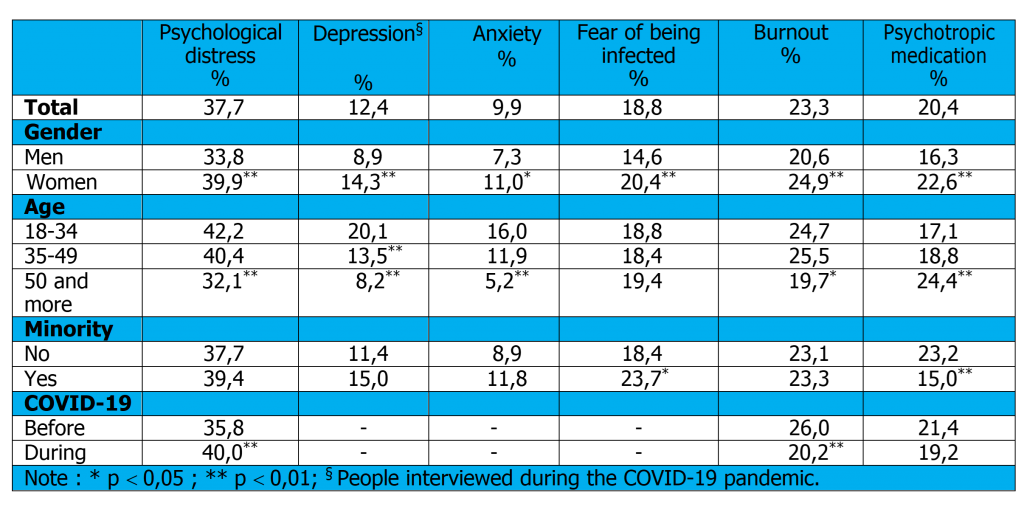FLASH Research: Mental health in the workplace during a pandemic
The importance of mental health problems in the workplace before and during the COVID-19 crisis:
Early results from ELOSMET Cycle-1
Cycle 1 of the Observatory on Workplace Health and Well-Being (ELOSMET) Longitudinal Study currently involves a sample of 69 Canadian workplaces and 4,307 employees aged 18 years and older. It is an online survey that is repeated annually for five years. It addresses several dimensions of workplace health and wellness, as well as a range of working conditions, non-work-life situations and personal characteristics.
Cycle-1 data collection, which is still ongoing, ran from May 2019 to October 2020, and the response rate was 37.8%. A total of 1967 individuals in 52 workplaces were surveyed during the COVID-19 pandemic, 92.6% of whom were telecommuting. The questionnaire was modified to reflect the situation caused by the health crisis.
The following table presents the main sociodemographic and workplace characteristics of this sample.

In this Research FLASH, we present the prevalences obtained for the major mental health problems that are the focus of OSMET's work. We also examine whether differences in prevalence are observed by gender, age, minority group, and COVID-19 effect.
The following questionnaires were used:
·Psychological distress: Minor psychiatric disorders (depressive symptoms, anxiety, irritability, cognitive problems) not specific to a particular illness. Scores of 4 and above on the General Health Questionnaire (GHQ-12).1
·Depression: Scores of 10 and above (moderate and greater symptoms) on the Patient Health Questionnaire (PHQ-9).2
·Anxiety: Scores of 10 and above (moderate and greater symptoms) on the General Anxiety Disorder (GAD-7).3
·Fear of being infected in the workplace with COVID-19: Percentage of employees who report being very or extremely afraid of being infected in the workplace with COVID-19.
·Burnout: Fatigue, physical and psychological exhaustion perceived by the individual to be work-related. Score of 50 and above (moderate symptoms and above) on the Copenhagen Burnout Inventory (CBI-7).4
·Psychotropic medication use: Use of at least one tranquillizer (e.g., diazepam, Valium), antidepressant (e.g., fluoxetine, Prozac), opiate (e.g., codeine, Ratio- Lenoltec #3), or sleeping pills (e.g., zoplicone, Imovane) in the past month.
The results are presented in the table below:

The findings are as follows:
- The prevalence of mental health problems is significant.
- Slightly more than one person in three reports problems of psychological distress, and between 10% and 23% report symptoms of depression, anxiety, fear of being contaminated by the COVID-19 virus, burnout or use of psychotropic drugs.
- Compared to men, women report more mental health problems.
- People aged 50 and over experience less mental health problems overall. Younger employees (18-34 years) appear to be at particular risk for depressive symptoms.
- Compared to the majority group, members of a minority group have a higher prevalence of fear of being infected in the workplace by the COVID-19 coronavirus, while the prevalence of psychotropic medication use is lower.
- Respondents during the COVID-19 pandemic show a higher prevalence of psychological distress, but lower for burnout.
Conclusion
According to the ELOSMET data, mental health impairment among employed individuals in this sample is significant. COVID-19 health status is associated with higher psychological distress, but the move to telecommuting appears to have decreased the experience of symptoms of work-related fatigue, physical exhaustion, and psychological exhaustion. However, caution should be exercised regarding this possible decrease, as other ELOSMET results suggest that telecommuting is associated with risk factors for burnout: psychological demands (workload, work pace, conflicting demands), number of hours worked, and work-family conflict.5
Mental health problems are more important for women than men, although the relative difference is smaller for psychological distress and burnout. Overall, women are 27%-69% more likely than men to report mental health problems. Mature employees (50 years and older) have a better situation in terms of mental health problems, a situation that can possibly be explained by a great deal of experience in the tasks to be accomplished as well as better working and living conditions outside the workplace. Finally, belonging to a minority group or not seems to have very little influence on mental health symptoms, although a slight difference seems to exist for fear of COVID-19 contamination and psychotropic medication use.
The results presented here will be updated periodically.
References
1. McDowell, I. & Newell, C. (1996) Measuring health: a guide to rating scales and questionnaires, 2nd edn. Oxford University Press, New York
2. Kroenke, K., Spitzer, R. L. & Williams, J. B. W. (2001). The PHQ-9: Validity of a brief depression severity measure. J Gen Intern Med, 16(9), 606-613.
3. Spitzer, R. L., Kroenke, K., Williams, J. B. W. & Löwe, B. (2006). A brief measure for assessing generalized anxiety disorder: The GAD-7. Archives of Internal Medicine, 166(10), 1092-1097.
4. Kristensen, T.S., Borritz, M., Villadsen, E. & Christensen, K.B. (2005) The Copenhagen Burnout Inventory: A new tool for the assessment of burnout, Work & Stress, 19(3), 192-207.
5. Observatoire sur la santé et le mieux-être au travail (2020). FLASH Recherche : Télétravail, conditions de travail et conflits travail-famille. Université de Montréal.https://osmet.openum.ca/en/flash-recherche-teletravail-conditions-de-travail-et-conflits-travail-famille/
Web site: www.osmet.umontreal.ca
About OSMET
The Observatoire sur la santé et le mieux-être au travail (OSMET) was born of a collaboration between the Faculty of Arts and Sciences, the Institut de recherche en santé publique (now the Centre de recherche en santé publique) and the School of Industrial Relations of the Université de Montréal. OSMET is financially supported by four founding partners: LifeWorks Wellness Solutions (formerly Morneau Shepell), McKesson Canada, Medavie Blue Cross and Pratt & Whitney Canada.
This content has been updated on 12 July 2023 at 0h51.
